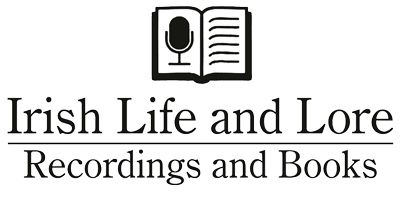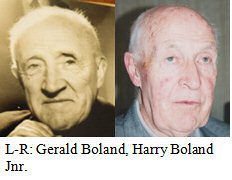Diarmuid O’Connor recalls his grandfather, Seán Ó Conchubhair, who was a founder member of the Gaelic League with Dr Douglas Hyde. He was born in Limerick and worked as a teacher for the Gaelic League. Many members of the O’Connor family, including father, sons and a daughter, joined F Company, 4th Battalion IRA in the Maynooth/Celbridge area. In July 1914, Pádraig O’Connor went with Art O’Connor to collect rifles from the Asgard at Howth. Diarmuid explains that the authorities became suspicious about Pádraig’s brother, Seán O’Connor, and in this they were correct as he had inducted Kelly, an IRA member in Maynooth, to the IRB. The family moved to Inchicore just before the Rising. Pádraig O’Connor provided a witness statement in which he refers to his attempt to get into a garrison in the city centre during Easter Week 1916. At this time he was aged 15 and his brother Seán was 13, and they were turned away due to their youth. He was arrested and taken to Beggar’s Bush Barracks but was later released. Diarmuid has a photograph of the Gaelic League Oireachtas of 1900 and he talks about the men in the group, which include his grandfather Seán Ó Conchubhair. He explains that though his grandfather never fired a shot, he was afforded a military funeral in 1926. In 1919 Pádraig O’Connor was captured while training men in Ballyfermot. He was tried in Lucan and received a sentence of 16 months, which he served in Derry Jail. Diarmuid described an incident which occurred during his trial, and the escape attempt made with Noel Lemass. During the War of Independence, Pádraig became a member of the Dublin Active Service Unit, and Diarmuid explains that members were paid £4 15s a week to stay away from home. He lists the incidents in which Pádraig took part. Cathal Brugha’s last letter was written to Pádraig O’Connor, in which he is critical of him. Diarmuid explains the thinking behind his uncle’s actions. The youngest brother, Michael O’Connor, was also active, and another brother Seán served as a Commandant in the Irish Army. Their sister, Mary Jo, left for France rather than fall out with her family over the Treaty. The last action of the War of Independence at the train ambush at Ballyfermot is mentioned. Diarmuid has his uncle Pádraig O’Connor’s collection of papers. He talks about Ernie O’Malley’s interviews with Pádraig, and it is his opinion that the O’Malley notebooks are more important than the witness statements of the Bureau of Military History. Pádraig O’Connor wrote his own account of the attack on the Four Courts which is the only account from a man who fought on the pro-Treaty side. Sleep Soldier Sleep: the life and times of Pádraig O’Connor is the title of Diarmuid O’Connor’s book about his uncle. He discusses his research and compares what he discovered to the account of Pádraig’s activities given to him by his father Piaras. He also discusses the account he was given of the execution of Erskine Childers, and says that his researches told a different story. A far greater number of executions took place during the Civil War than took place in 1916, and Diarmuid says that this was necessary in order to bring the war to an end. He also discusses Kevin O’Higgins and his reputation. The 1924 mutiny in the Free State Army is recalled. At this time Pádraig was a founder member of the Irish-speaking battalion. He was called on by Minister for Defence Richard Mulcahy to break the mutiny. The chief mutineers were Charlie Dalton and Tom Cullen, who were under arrest at this time. Diarmuid recalls his uncle’s account of these events and considers some aspects of the account. The early days of the Free State Army and the tensions between the men are discussed, and Diarmuid talks about some operation reports in Pádraig’s papers which relate in particular to Kerry. Pádraig O’Connor married Nellie O’Brien from Bluebell. He retired as a full Colonel in 1949, and Diarmuid details his uncle’s career and his early death. The accidental killing, in June 1921, of Alexandra Wright at Trinity College Dublin is recalled, as are Pádraig O’Connor subsequent feelings of regret. There were five Black and Tan medals in the O’Connor family, Diarmuid says. The trial of Paddy Rigney, whom he interviewed in the 1980s, is recalled. He discusses his interest in the modern Troubles, and explains his attitude by telling an anecdote about the last night on earth of Seán Heuston. The support given by the British administration to the Free State Army is considered, and Diarmuid gives his opinion on a recent theory that a British army unit was nearby at the bombing of the Four Courts. He recalls the 2:1 vote by the people for the Treaty, which he says should be remembered. He explains what a ‘trucer’ was and how his Uncle Pádraig despised such people. Pádraig’s brother Piaras worked in the boiler house at the Hospital Sweepstakes and Diarmuid describes the way in which Pádraig was received when he paid a visit there. Their sister, Mary Jo, is recalled, and it is explained that she is one of the few women to be awarded a Black and Tan medal and also, as Madame Josephine François, a medal for her role in the French Resistance during WWII. Mary Jo O’Connor was a very active member of Cumann na mBan. She would not take the pro-Treaty side and Diarmuid provides a probable reason for this. The influence of their father on that generation of the O’Connor family is examined. All the children attended his school in Killaloe and Diarmuid has traced the family tree and discovered a relative, Tom O’Connor, who was an active Fenian. In 1918 Seán Ó Conchubhair was elected a member of Dublin Corporation on a Socialist Republican ticket, along with W. T. Cosgrave. Diarmuid has found an account in Forth the banners go: reminiscences of William O’Brien, as told to Edward MacLysaght (1969) of the difficulty Seán faced when he insisted on taking the oath in Irish. Diarmuid explains the title of his book Sleep Soldier Sleep, taken from a line from Walter Scott’s poem The Lady in the Lake which his Uncle Pádraig had written on his folder of papers and documents. It was very important to Diarmuid that he published a factually correct record, and he explains that he commissioned journalist Frank Connolly to assist with his work on the book.

Diarmuid O’Connor (b.1946)
Diarmuid O’Connor (b.1946)
€10.00 – €20.00
Additional information
| Type: | MP3 |
|---|---|
| Audio series: | The 1916 Rising Oral History Collections |
| Bitrate: | 128 kbps |
| Download time limit: | 48 hours |
| File size(s): | 52.55 MB |
| Number of files: | 2 |
| Product ID: | CD191602-116 |
| Subject: | Pádraig O’Connor (Interviewee’s uncle) Seán Ó Conchubhair (Interviewee’s grandfather) Mary Jo François (née O’Connor) (Interviewee’s aunt) |
| Recorded by: | Maurice O’Keeffe – Irish Life and Lore |








